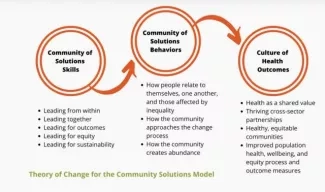Why It Matters

Photo by Jody Roberts | Kennebec River; Waterville, Maine | flickr
When COVID-19 hit in 2020, leaders in Waterville, Maine, applied the skills they learned as a SCALE community to deal with the crisis. SCALE, short for Spreading Community Accelerators through Learning and Evaluation, was part of the 100 Million Healthier Lives initiative (2014-2020) convened by the Institute for Healthcare Improvement (IHI) and funded by the Robert Wood Johnson Foundation to fundamentally change the way people think and act to improve health, well-being, and equity.
Leaders in Waterville used what they had learned about “leading from within” and “leading together” to help their community handle a COVID-driven spike in food insecurity. “It set us up to respond as effectively as possible during the pandemic,” said Frances Mullin, director of Healthy Northern Kennebec, a Waterville-based community coalition focused on food insecurity. “There are a lot of things that we wouldn’t have been able to do if we hadn’t [already] done the work of building cross-sector partnerships.”

Figure 1. The Community Solutions Framework
The stress and rapid change brought by COVID-19 reinforces the importance of using models like the Community of Solutions framework (Figure 1) to build relationships and partnerships to collaborate for positive change. According to Thriving Together: A Springboard for Equitable Recovery and Resilience in Communities Across America, a guide outlining the conditions needed to thrive in the wake of COVID-19, when leaders see a community as “a dynamic network of interacting people, structures, and systems,” it allows them to “understand where new relationships are needed or where they should join existing efforts versus creating new interventions of their own.”
Like many communities, Waterville experienced an alarming array of COVID-driven challenges last spring. “During the pandemic, starting pretty quickly in March, a lot of people lost their jobs, and the issue of food insecurity became pretty obvious,” Mullin said. “There were so many emergency situations that we had to respond to as a community.” The soup kitchen, which had been feeding 100 people a day, suddenly closed, as did the evening sandwich program for a time. Hotels were suddenly empty, and restaurants had no customers. School buildings — where a significant number of the kids in town got their lunches — closed while education moved to remote learning. Layoffs hit the town hard.
Before the pandemic, Healthy Northern Kennebec had made considerable progress against chronic hunger, but it was suddenly not enough. In a town whose population is less than 17,000, about 1,000 residents were seeking meals each day.
The idea of leadership from within became a “foundation” for what followed, Mullin said, including developing a “mindset that ‘Oh, my gosh, it’s not just a small percentage of our population [affected by food insecurity] now.’ New structures had to come about.”
The relationships and partnerships which the community had developed as part of SCALE proved to be essential for creating those new structures. The Alfond Youth Center, for example, had a kitchen capable of preparing 1,000 meals per day and staffers idled by the lockdown. Colby College also had unused kitchens and staff. MaineGeneral Medical Center donated meals. “It was a big triangle of people helping each other out to make sure that everyone could get healthy food every day,” Mullin said.
Using the leading from within concept of “unlocking the leadership of others, especially those with lived experience of inequity,” community leaders sought advice from those seeking meals about how to improve the system. When it became clear that some people were nervous about food distribution lines because of potential COVID-19 exposure for themselves and volunteers, the coalition worked with the Chamber of Commerce to provide gift certificates for take-out meals. This helped to keep business flowing to restaurants while helping those who needed meals.
“People were testing ideas constantly and not having everything solved,” Mullin recalled. “It was constant iteration and constant tweaking of possible solutions.” As the Thriving Together guide notes, this kind of persistent experimentation is an important part of leading from within: “The concept of failing forward not only accepts that mistakes will be made in any transformative work but embraces them as a critical part of learning.” Or as Mullin kept telling herself: “The path will be created with every step.”
The community worked together to solve other problems. The emptied hotels started sheltering those experiencing homelessness, and school buses delivered meals to students who no longer got lunch in school.
“The thing that was a system change was that we worked not in silos, but in focused areas,” Mullin said. “During the pandemic, the systems came together — the hospital system, the college system, the nonprofit youth center — to say, ‘How else can we address this growing need?’”
Waterville is not an isolated example, said Marianne McPherson, senior director at IHI who has heard from others about how they’ve dealt with COVID-19 by using the skills they learned while taking part in the 100 Million Healthier Lives initiative. “[These skills] are a set of practices that communities grow together over time,” she said.
When the pandemic is finally behind us, Mullin hopes that Waterville retains these lessons and the cooperative mindset that’s developed. “We’re in the same storm even though we’re in different boats,” she said. “I think that’s going to stick. I hope that ‘us and them’ thinking is less [prevalent] because people had their eyes opened in the last year.”
You may also be interested in:
Deep Dive - Basic Needs: Health Care — IHI's contribution to the Thriving Together: A Springboard for Equitable Recovery and Resilience in Communities across America report
100 Million Healthier Lives Change Library — Searchable, peer-reviewed implementation resources to improve health, well-being, and equity
